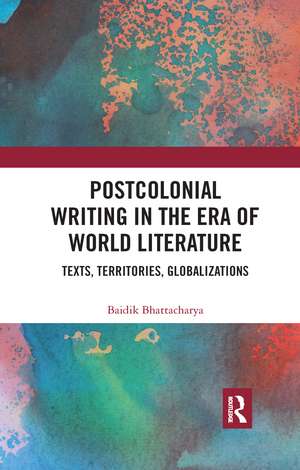Postcolonial Writing in the Era of World Literature: Texts, Territories, Globalizations
Autor Baidik Bhattacharyaen Limba Engleză Paperback – 18 dec 2020
Ambitious in scope, this book challenges many of the existing theoretical and literary frameworks and offers a radical reimagination of the fields. The volume, written in an accessible and lively prose, will be indispensable for scholars and researchers of literature, critical theory, postcolonial studies, cultural studies, and comparative literature.
Preț: 311.41 lei
Nou
Puncte Express: 467
Preț estimativ în valută:
59.60€ • 62.06$ • 50.37£
59.60€ • 62.06$ • 50.37£
Carte disponibilă
Livrare economică 18 februarie-04 martie
Livrare express 01-07 februarie pentru 32.66 lei
Preluare comenzi: 021 569.72.76
Specificații
ISBN-13: 9780367734282
ISBN-10: 0367734281
Pagini: 198
Dimensiuni: 138 x 216 x 21 mm
Greutate: 0.45 kg
Ediția:1
Editura: Taylor & Francis
Colecția Routledge India
Locul publicării:Oxford, United Kingdom
ISBN-10: 0367734281
Pagini: 198
Dimensiuni: 138 x 216 x 21 mm
Greutate: 0.45 kg
Ediția:1
Editura: Taylor & Francis
Colecția Routledge India
Locul publicării:Oxford, United Kingdom
Public țintă
PostgraduateCuprins
Acknowledgments. Introduction: Poetics of Anglophone Territories. 1. Chapter I: Cunning of Empire 2. Chapter II: Belated Territories 3. Chapter III: Provincial Aesthetics 4. Chapter IV: Minority Report 5. Chapter IV: A Short History of Death. Index
Notă biografică
Baidik Bhattacharya is Assistant Professor at the Department of English, University of Delhi, India. He was previously a Lecturer of English Literature at the University of Newcastle, UK (2006–10). He is the co-editor of The Postcolonial Gramsci (Routledge, 2012). His essays have appeared in Critical Inquiry, New Literary History, Boundary 2, Novel: A Forum on Fiction, Interventions, and Postcolonial Studies among other places. He also serves on the editorial board of the journal Postcolonial Studies.
Recenzii
‘This deeply absorbing, brilliantly argued and theoretically complex study is a provocative contribution to the "world literature" debate. Bhattacharya’s persuasive reading of the aesthetic legacies of empire suggests that world literature today is postcolonial Anglophone writing. This book should be required reading for scholars of modern global literatures.’ - Supriya Chaudhuri, Professor Emerita, Department of English, Jadavpur University, Kolkata, India‘In Postcolonial Writing in the Era of World Literature, Baidik Bhattacharya challenges those who consider that World Literature has rendered the Postcolonial outmoded: he resituates the debate to show that it is not a question of the one following the other or of simply being able to choose one over the other, showing that World Literature is itself an Orientalist construction. Its western adherents remain blithely oblivious to its postcolonial condition, determined by the very problem that they imagine World Literature has allowed them to ignore. A powerful and persuasive intervention, a game-changer.’ - Robert J.C. Young, Julius Silver Professor of English and Comparative Literature, New York University, USA
Descriere
This book explores the debates surrounding postcolonial studies & world literature. It asserts that as an analytical framework the idea of world literature is dead: the 19th century ideal of world literature had always & already been embedded in colonial histories; the promise it held out has been exhausted by postcolonial Anglopho
